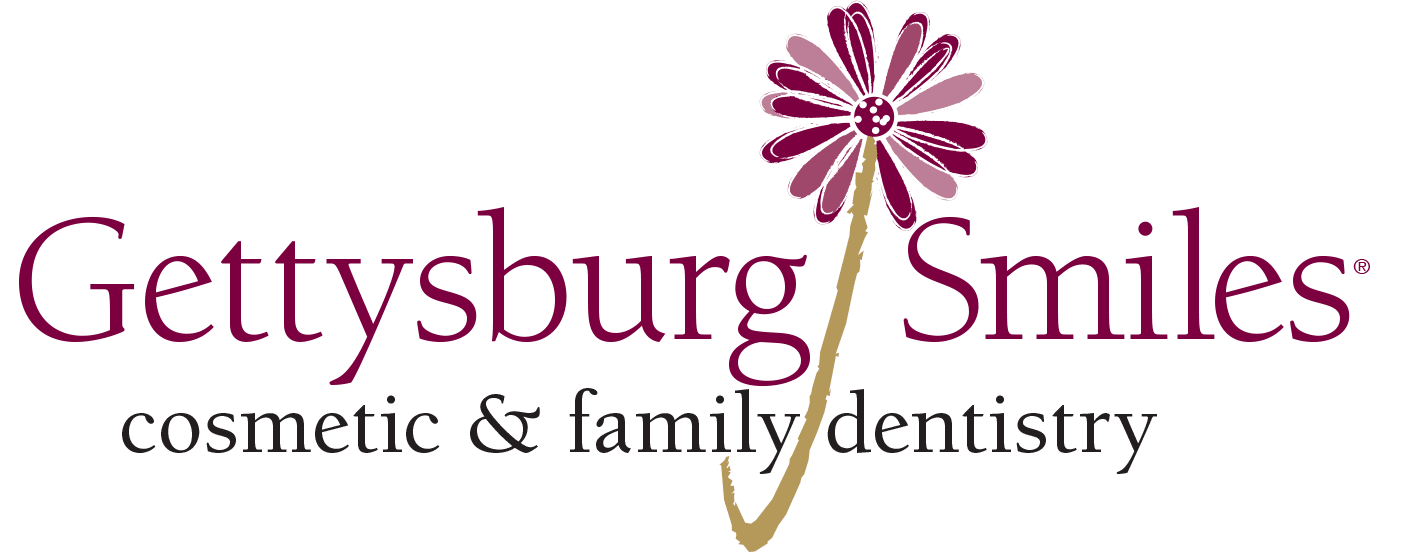If you have one or more discolored or damaged teeth, dental bonding can help renew your smile’s appearance. Dental bonding is a cosmetic dental treatment that uses composite resin to cover tooth imperfections. At Gettysburg Smiles, we provide tooth bonding treatment that is customized to your cosmetic goals. Dr. Rita Tempel offers professional cosmetic teeth bonding treatment for patients in her Gettysburg, PA, dental office.
Tooth chips and cracks impact the smile’s look and leave teeth prone to more damage. It is important to immediately address problems like chips in cracks in the tooth enamel. Pressure on these teeth can damage them further, and patients can lose more of their natural tooth enamel over time. A dental bonding treatment can add to the tooth structure, create a more uniform look, and prevent further damage.


Dental Bonding Treatment and Care in Gettysburg, PA
Composite material is not just for white dental fillings. Dental bonding treatment offers an effective treatment option for patients who want to address broken, worn, and stained teeth. Before bonding treatment, we ensure that patients are in good oral health. If patients have additional dental problems, including dental infections, we need to treat those problems first. Cosmetic care is more effective in healthy patients.
To begin treatment, we clean and prepare the teeth for bonding. Then, we apply a high-quality composite resin to the teeth. This resin is color-matched to blend with other natural teeth. We sculpt the resin material to create the correct shape. Then, once the tooth is the correct color, length, and shape, we harden the bonding material with a curing light. Finally, we polish the newly bonded tooth.
The Benefits of Dental Bonding
This process helps fix minor imperfections like chips, cracks, discoloration, and small gaps. Many people choose dental bonding because it is quick, affordable, and provides natural-looking results.
Quick and Painless Procedure
One of the biggest advantages of dental bonding is how fast and painless the process is. Unlike other dental treatments, bonding usually takes just one visit to complete. Most procedures take less than an hour per tooth. In many cases, bonding does not require anesthesia unless used to fill a cavity. Since the process is minimally invasive, patients can return to normal activities immediately after the appointment.
Improves the Appearance of Teeth
Dental bonding is a great solution for fixing minor cosmetic imperfections. It can repair small chips, cracks, and stains, making teeth look smoother and healthier. It can also be used to close small gaps between teeth or make slightly misshapen teeth look more uniform. The resin material is color-matched to your natural teeth, ensuring a seamless and attractive result.
Affordable Cosmetic Solution
Dental bonding is a much more affordable option than other cosmetic dental treatments like veneers or crowns. While veneers require custom fabrication in a dental lab, bonding is done directly on the tooth in one visit. This makes it an excellent choice for patients who want to improve their smile without spending much money. Despite being cost-effective, dental bonding still provides noticeable and long-lasting improvements.
Minimally Invasive with No Major Alterations
Unlike porcelain veneers or crowns, which require some removal of the tooth’s enamel, dental bonding is a conservative treatment. The dentist only needs to slightly roughen the surface of the tooth to help the bonding material adhere. This means that more of the natural tooth structure is preserved, making bonding a safer and less permanent option. If needed, the bonding can also be easily repaired or replaced.
Boosts Confidence and Self-Esteem
Having a smile you feel good about can greatly improve your confidence. Many people feel self-conscious about small imperfections in their teeth, but dental bonding can provide a quick and effective solution. Whether fixing a chip, covering a stain, or reshaping a tooth, bonding helps create a more attractive smile. This can make you feel more comfortable speaking, smiling, and socializing.
Simple Maintenance and Long-Lasting Results
Caring for bonded teeth is easy and does not require any special treatment. You just need to brush, floss daily, and visit our office regularly for check-ups. While the resin material is not as strong as natural enamel or porcelain, it can last several years with proper care. Avoiding biting hard objects like ice or pens can help extend the lifespan of your dental bonding.
Dental Bonding FAQs
Dr. Tempel is an experienced cosmetic dentist in Gettysburg. She can provide you with teeth-bonding treatment if you are looking for an affordable way to transform your smile. If you want to learn more about the procedure, begin here with common questions regarding dental bonding. Our goal is to provide you with as much information as you need to make informed decisions about your cosmetic treatment. If you have additional questions, please feel free to contact us.
Can dental bonding fix discolored teeth?
Yes, dental bonding can fix discolored teeth. During the procedure, Dr. Tempel will apply the tooth-colored resin to the surface of the tooth, covering the stains or discoloration. This cosmetic solution provides a natural appearance and effectively improves the tooth’s color. This is why tooth bonding is a popular and non-invasive option for enhancing the aesthetics of discolored teeth.
How long will dental bonding last?
The lifespan of dental bonding typically ranges from 5 to 10 years. However, it can last even longer if you take good care of your teeth. Factors such as oral hygiene, biting or chewing habits, and the location of the bonding can influence its durability. Regular dental check-ups and avoiding habits that can damage the bonding help extend its longevity.
Will dental bonding stain?
Dental bonding materials are resistant to stains, but they can still be affected by substances like coffee, tea, and tobacco. While bonding is less prone to staining than natural teeth, it’s advisable to avoid or minimize consumption of staining agents and maintain good oral hygiene to preserve its appearance over time. Consuming an excessive amount staining agents or smoking can eventually make your bonded teeth look dull.
Can dental bonding fix misshapen teeth?
Yes, dental bonding can fix misshapen teeth effectively. Dr. Tempel will apply the tooth-colored resin to the tooth’s surface and shape it into the desired form to make the appear straight and natural. Dr. Tempel is a talented cosmetic dentist that can enhance your tooth’s shape with dental bonding, creating a more aesthetically pleasing smile. It’s a minimally invasive and affordable option for improving the shape of misshapen teeth.
How is teeth bonding different from veneers?
Teeth bonding and dental veneers are both cosmetic dental procedures that we can use to improve the appearance of your teeth. However, they use different materials, and the procedures are unique. Teeth bonding involves applying a tooth-colored resin directly to the tooth and molding it into shape. Teeth veneers are porcelain shells that must be custom-made in a dental lab. Your dentist will need to bond them to the front of your teeth.
Can I eat normally after teeth bonding?
Yes, you can eat normally after teeth bonding. However, we caution you against biting or chewing on hard objects. These actions can damage the bonded teeth and will require touch-ups. As with any dental procedure, it is also crucial to maintain good oral hygiene practices. Avoid things that can stain your teeth, brush, and floss regularly, and visit your dentist to ensure the longevity of your bonded teeth.
Can I get teeth bonding on the front and back teeth?
You can get teeth bonding for both front and back teeth. It is a versatile cosmetic dental procedure that can address many dental concerns. Your dentist can apply it to any tooth surface in your mouth, making it a suitable option for both the front and back teeth.
Can I get cavities under teeth bonding?
It is possible to develop a cavity under teeth bonding. While the bonding material cannot decay, the natural tooth under it and around it can develop tooth decay. Maintain good oral hygiene practices to prevent cavity formation under the bonded teeth. Brush and floss regularly, and visit your dentist for regular check-ups and cleanings.
Contact Our Office Today to Schedule a Consultation for Teeth Bonding in Gettysburg, PA
Do you have a small chip or crack in a front tooth? Are you interested in dental bonding treatment? Request a dental appointment online or call Gettysburg Smiles for care today at (717) 853-1552. Dental bonding is a subtle, non-invasive way to improve the aesthetics of your smile. Please let us know if you have any questions about bonding or composite treatment, and we will be happy to assist you.
